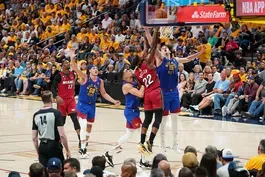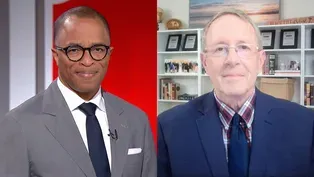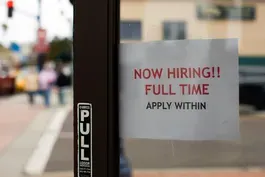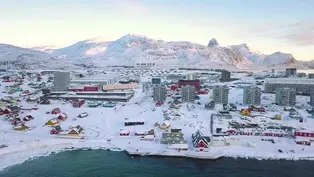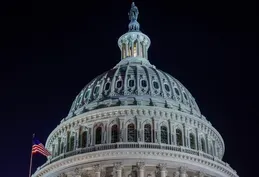
Attacks in Russia raise questions about next phase of war
Clip: 6/2/2023 | 7m 42sVideo has Closed Captions
Attacks inside Russia raise questions about next phase of Ukraine war
For over a year, attention has focused on Russia’s invasion and attacks inside Ukraine. But in recent weeks, the war has expanded to attacks inside Russia. Friday, the Kremlin reported further explosions and incursions in its homeland as pro-Ukrainian proxy forces step up raids. Geoff Bennett discussed the attacks with Jennifer Cafarella of the Institute for the Study of War.
Problems with Closed Captions? Closed Captioning Feedback
Problems with Closed Captions? Closed Captioning Feedback
Major corporate funding for the PBS News Hour is provided by BDO, BNSF, Consumer Cellular, American Cruise Lines, and Raymond James. Funding for the PBS NewsHour Weekend is provided by...

Attacks in Russia raise questions about next phase of war
Clip: 6/2/2023 | 7m 42sVideo has Closed Captions
For over a year, attention has focused on Russia’s invasion and attacks inside Ukraine. But in recent weeks, the war has expanded to attacks inside Russia. Friday, the Kremlin reported further explosions and incursions in its homeland as pro-Ukrainian proxy forces step up raids. Geoff Bennett discussed the attacks with Jennifer Cafarella of the Institute for the Study of War.
Problems with Closed Captions? Closed Captioning Feedback
How to Watch PBS News Hour
PBS News Hour is available to stream on pbs.org and the free PBS App, available on iPhone, Apple TV, Android TV, Android smartphones, Amazon Fire TV, Amazon Fire Tablet, Roku, Samsung Smart TV, and Vizio.
Providing Support for PBS.org
Learn Moreabout PBS online sponsorshipGEOFF BENNETT: For over a year, most of the attention has focused on Russia's invasion of Ukraine and attacks inside Ukraine.
But, in recent weeks, the war has expanded to attacks inside Russia.
Today, the Kremlin reported further explosions and incursions in its homeland, as pro-Ukrainian proxy forces step up raids along Ukraine's border.
The attacks have been sporadic and shouted in mystery.
Some have struck the periphery of Russia's Western border with Ukraine, while others have hit hundreds of miles within Russia.
The spillover of Moscow's war inside Russia intensified this week, with pro-Ukrainian groups releasing drone shots claiming to have destroyed Russian military targets.
Today, Moscow state TV aired footage of civilians fleeing a border region of Belgorod, where officials reported two deaths.
Residents described chaotic scenes at the site of an alleged explosion.
WOMAN (through translator): We were given two hours to get through.
We left without things, without anything, without documents.
And as we were coming up, we saw the explosion in front of our eyes.
GEOFF BENNETT: In recent days, Belgorod has come under heavy bombardment.
Other attacks have been reported in neighboring Bryansk.
But there's also been a spate of unconfirmed incidents far from the front line targeting oil refineries, pipelines, ammunition depots and railway junctions.
Ukraine says the cross-border incursions are the work of anti-Kremlin Russian fighters.
Last month, they seized several frontier towns before withdrawing to Ukraine.
One group behind the raids is known as the Russian Volunteer Corps.
Its leader is a notorious Russian nationalist with links to neo-Nazi groups.
The second group calls itself the Freedom of Russia Legion, and fight alongside Ukrainian soldiers under a flag used by Russian opposition groups.
Today, a spokesperson for the group outlined its broad aims, to liberate Russian territories, but also divert Moscow's troops.
ALEXEI BARANOVSKY, Freedom Russia Legion (through translator): One of our tactical aims is to draw Russian troops from other parts of the Ukrainian front, to force them to relocate substantial forces from the front lines of Ukraine and get them to protect their borders.
GEOFF BENNETT: Russia calls the anti-Kremlin fighters terrorists.
Today, at a virtual security meeting, Russian President Putin alluded to the assaults within Russia and vowed to crush the groups responsible.
VLADIMIR PUTIN, Russian President (through translator): Today, we will deal with the security of Russia, taking into account the efforts that our ill-wishers are still making and intensifying in order to stir up the situation inside the Russian Federation.
GEOFF BENNETT: Meantime, Moscow's military has escalated its aerial assault on Ukraine, this month launching more than 20 waves of attacks on the capital, Kyiv.
That carried into today, as residents took shelter in Kyiv's metro, as Ukraine fended off a sixth straight day of bombardments.
For more on the attacks inside Russia, why they're happening and who is conducting them, we turn to Jennifer Cafarella, national security fellow at the Institute for the Study of War.
Thank you for being with us.
And, Jennifer, when you look at these attacks, what do you see?
And what do you think are the objectives of the groups that are responsible for them?
JENNIFER CAFARELLA, Institute for the Study of War: So there are clearly two separate lines of effort, both of which are applying pressure within Russia, that does have the potential to make conditions easier for the Ukrainian armed forces as they launch their major counteroffensive, which has not yet begun.
The first line of effort or these cross-border raids.
What's most remarkable about them is actually the scale to which the Russians are panicking and the scale to which it is dominating these narratives, which is much larger than the actual raids taking place on the ground, which are quite small and opportunistic.
The second line of effort is the deep strikes that it appears the Ukrainians are doing to target supply lines, things like oil depots, and other elements of the resupply that the Russian forces in Ukraine are going to need in order to mount their defense.
That second line of effort is much more robust and much more directly supportive of whatever the Ukrainian armed forces are preparing for their next move.
GEOFF BENNETT: What effects are these different -- what effects are these different attacks having on Russia and Russia's ability to fight in Ukraine?
JENNIFER CAFARELLA: The cross-border raids are having the effect of accelerating the panic, essentially, of the Russian forces and of some of those border towns and populations within Russia.
And that's an important informational effect, right?
It continues to support the broader narrative that not only has Russia not won this war, but it's entirely possible that Russia will lose this war.
That's important.
So too is the fact that these cross-border raids have started to draw Russian military forces away from front lines and to reinforce those border towns.
That's a condition that supports the Ukrainian offensive.
Separately, we also are having just broader disarray in some areas with the Russian ability to organize and mount a capable defense.
And that disruptive disarray is a key effect that the Ukrainians have achieved time and time again ahead of offensive operations.
GEOFF BENNETT: Jennifer, how is the Kremlin responding to these attacks?
JENNIFER CAFARELLA: The Kremlin is reinforcing some of the border areas and trying to signal essentially that they're treating this as primarily a threat in the information space, because, again, the actual hard fighting on the ground is relatively limited.
But the Kremlin is taking pains to show that its population -- that it's taking it seriously and that it will reinforce this area.
And what that means is, the Kremlin is starting to make hard choices about where to allocate a limited number of assets.
And that's exactly where the Ukrainians would want them to be.
GEOFF BENNETT: How much coordination is there among the groups that are responsible for these attacks and between the groups and Ukraine?
JENNIFER CAFARELLA: If we're talking about the cross-border raids, not those deeper drone strikes, but the raids themselves, we're not sure.
These are actually relatively small groups that are claiming responsibility for these attacks.
There's reporting that links them to the Ukrainian military intelligence.
I can't say from unclassified sources whether that's true or not.
All I can observe is that, again, this is a small line of effort.
And it certainly doesn't require a significant amount of Ukrainian support or Ukrainian coordination.
So, whatever level of contact is there, I expect, is minimal.
I would also hope that it's minimal, given that some of the groups involved, as was already mentioned, have problematic ideologies and are not the type that we would like to see supported on the battlefield.
GEOFF BENNETT: Well, how does Ukraine contend with that, the fact that one of these groups is linked to neo-Nazis?
JENNIFER CAFARELLA: Well I think the Ukrainians are in the position -- we have to keep in mind that this is an existential fight for their ability to survive as a nation and as a people.
And I fully expect that there are those within the Ukrainian government and Ukrainian military and intelligence that see that Putin has domestic enemies, right?
And, sometimes, the enemy of my enemy is my friend in war.
I think there's a certain kind of logic to that.
These groups did already exist.
The Ukrainians, from what we know didn't create them.
These are Russians that desire to fight back against Putin.
And what the Ukrainians seem to be doing is exploiting it, at least in the information space, and, again, possibly with some small level of contact.
GEOFF BENNETT: Jennifer Cafarella is the national security fellow at the Institute for the Study of War.
Thanks so much for your insights.
We appreciate it.
Breaking down the NBA Finals between Denver and Miami
Video has Closed Captions
Clip: 6/2/2023 | 6m 6s | Breaking down the NBA Finals matchup between Denver and Miami (6m 6s)
Capehart and Abernathy on the debt deal and 2024 campaign
Video has Closed Captions
Clip: 6/2/2023 | 11m 44s | Capehart and Abernathy on the debt deal and race for the GOP presidential nomination (11m 44s)
Economy adds jobs despite inflation, interest rate hikes
Video has Closed Captions
Clip: 6/2/2023 | 6m | U.S. economy adds more jobs in face of inflation and interest rate hikes (6m)
Greenland unveils draft constitution in independence effort
Video has Closed Captions
Clip: 6/2/2023 | 8m 24s | Greenland unveils draft constitution in push for complete independence from Danish control (8m 24s)
White House adviser discusses deal to raise debt ceiling
Video has Closed Captions
Clip: 6/2/2023 | 5m 54s | White House adviser Gene Sperling discusses bipartisan deal to raise debt ceiling (5m 54s)
Providing Support for PBS.org
Learn Moreabout PBS online sponsorshipSupport for PBS provided by:
Major corporate funding for the PBS News Hour is provided by BDO, BNSF, Consumer Cellular, American Cruise Lines, and Raymond James. Funding for the PBS NewsHour Weekend is provided by...
